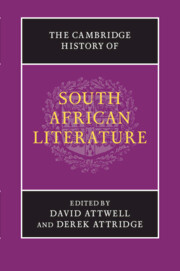Book contents
- Frontmatter
- Introduction
- PART I ORATURES, ORAL HISTORIES, ORIGINS
- PART II EXPLORATION, EARLY MODERNITY AND ENLIGHTENMENT AT THE CAPE, 1488–1820
- PART III EMPIRE, RESISTANCE AND NATIONAL BEGINNINGS, 1820–1910
- 9 Writing settlement and empire: the Cape after 1820
- 10 The mission presses and the rise of black journalism
- 11 The imperial romance
- 12 Perspectives on the South AfricanWar
- 13 The beginnings of Afrikaans literature
- PART IV MODERNISM AND TRANSNATIONAL CULTURE, 1910–1948
- PART V APARTHEID AND ITS AFTERMATH, 1948 TO THE PRESENT
- PART VI SOUTH AFRICAN LITERATURE: CONTINUITIES AND CONTRASTS
- Index
- References
9 - Writing settlement and empire: the Cape after 1820
from PART III - EMPIRE, RESISTANCE AND NATIONAL BEGINNINGS, 1820–1910
Published online by Cambridge University Press: 28 January 2012
- Frontmatter
- Introduction
- PART I ORATURES, ORAL HISTORIES, ORIGINS
- PART II EXPLORATION, EARLY MODERNITY AND ENLIGHTENMENT AT THE CAPE, 1488–1820
- PART III EMPIRE, RESISTANCE AND NATIONAL BEGINNINGS, 1820–1910
- 9 Writing settlement and empire: the Cape after 1820
- 10 The mission presses and the rise of black journalism
- 11 The imperial romance
- 12 Perspectives on the South AfricanWar
- 13 The beginnings of Afrikaans literature
- PART IV MODERNISM AND TRANSNATIONAL CULTURE, 1910–1948
- PART V APARTHEID AND ITS AFTERMATH, 1948 TO THE PRESENT
- PART VI SOUTH AFRICAN LITERATURE: CONTINUITIES AND CONTRASTS
- Index
- References
Summary
The period from the 1820s to the 1870s is a problematic one for South African literary history written in English. With the notable exception of the poetry of Thomas Pringle, not much happens in the official genres and no single literary work survives as anything other than a period piece. If, however, one broadens the boundaries of literary history to include a variety of genres conventionally overlooked or marginalised by it – diaries/journals, letters, articles in the periodical press, politically motivated writing, for example – then the ‘field’ enlarges significantly. Envisaged in this way, literary history also intersects with the expanding civic infrastructure of schools, libraries, art galleries, museums, learned societies, newspapers and periodicals. In effect, since early colonial literary activity is simply too sporadic to generate those forms of continuity which we associate with a national literature, it is necessary to expand the remit of literary history to include diverse forms of print production and cultural practice. For similar reasons, the work of outsiders commenting on South African affairs may be regarded as indigenous insofar as these writers enter into the currents of intellectual life and contribute to the formation of colonial identity. The best known and most influential of these works was Anthony Trollope's two-volume South Africa, an account of a five month visit to the country published in 1878. The book provoked widespread debate among colonial readers – in itself an indication that colonial South Africans were beginning to conceive of themselves as a distinctive national group rather than merely a province of empire.
- Type
- Chapter
- Information
- The Cambridge History of South African Literature , pp. 181 - 203Publisher: Cambridge University PressPrint publication year: 2012

